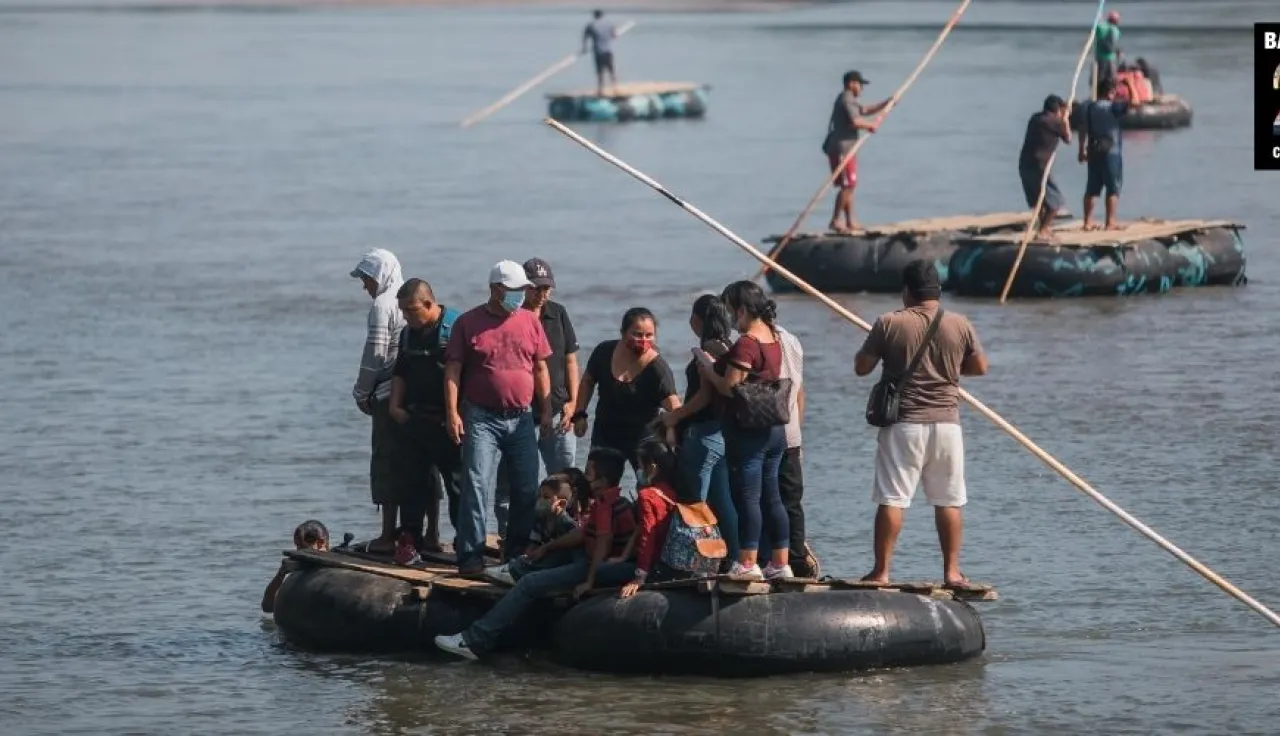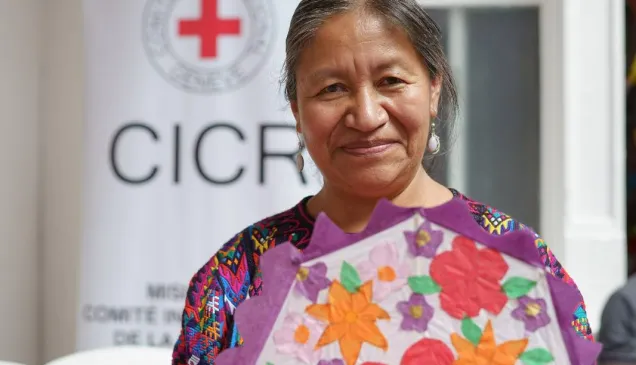Editorial: Mexico y Central America, the humanitarian priorities

Migration, disappearances, violence, use of force and prision emergency: the 5 most pressing issues in 2022
By Jordi Raich, head of the ICRC's regional delegation for Mexico and Central America.
Anual Report 2021

As this report shows, armed violence continues to take its toll in Mexico and Central America, and we continue to address the needs of the people affected.
The impact of the violence is seen only occasionally – for example, when there are mass shootings or destruction of infrastructure. But in most instances, the impact of the violence is invisible: the unseen cause behind migration, internal displacement, disappearances, worsening mental health and the lack of access to basic services such as health care and education.
In a region affected by various forms of violence and inequality, it is difficult to prioritize one kind of humanitarian need over another; but this year, we would like to highlight the five issues we consider to be the most pressing in both 2022 and – given the prolonged and structural bases of these issues –most likely for the years to come.
They are complex issues that require decisive action by governments, civil society and other humanitarian organizations. Working with National Societies and the rest of the International Red Cross and Red Crescent Movement, they are the focus of our humanitarian work.
Although there are no official statistics on undocumented migration in Mexico, it is clearly on the rise. The National Institute of Migration reported a 68% increase in the number of migrants being detained, rising from 182,940 in 2019 to 307,679 in 2021. Many of these people are vulnerable. For example, 24% of those who were detained in Mexico in 2021 were unaccompanied minors under the age of 11.
In general, migration has many causes and the number of people involved constantly in flux. In Mexico and Central America, migration has at root three main causes: the widescale violence afflicting communities, the socio-economic impact of natural disasters and the COVID-19 pandemic, and families' need for reunification.
After fleeing harsh conditions in their own countries, migrants face serious risks along their migration route –such as blackmail, kidnapping and sexual abuse– that endanger their lives and threaten their dignity. In response to these worrying situations, our teams seek to prevent, reduce and minimize these dangers both in terms of their frequency and their impact, in particular with regard to vulnerable people.
Beyond emergency measures, there is an urgent need to design and implement medium –and long– term strategies that deal with the root causes that explain why millions of people abandon their homes. We also urgently need to understand that the history of humanity is the history of migration, to accept that it will continue to be, and to grasp that it is everyone's duty to ensure that migrants' rights are upheld whenever and wherever they happen to be, and to make migration routes safer.
Every year in Mexico and Central America, thousands of more families discover the pain of not knowing what has happened to a loved one who has disappeared, whether in their home country or abroad. At the same time, people have an ethical and social duty to identify the bodies of those who have died, including along migration routes, and return them to their families for a proper funeral.
In Mexico alone, more than 96,000 people are recorded as missing on the national register, of which 7,449 were recorded in 2021. In El Salvador, according to the public prosecutor's office, there were 488 unsolved missing persons cases. In Guatemala, 6,343 alerts were issued for women who had gone missing, of which 663 remained active as of December. This number does not take account
of those who went missing in recent wars, which amounts to more than 45,000 Guatemalans and 8,000 Salvadoreans.
The bad news does not end there. The absence of official statistics for all Central American countries combining cases in one simple database means that in fact many more people are missing and deserve to be looked for, regardless of how much time may have passed.
We work with families, the authorities and forensic specialists to facilitate the necessary and urgent coordination of multidisciplinary responses. We also seek to drive forward the efficient implementation of the Missing Persons Act in Mexico and to promote regulatory frameworks in Guatemala, Honduras and El Salvador
The pandemic has decimated the livelihoods of countless communities and millions of already vulnerable families; it has had serious social and economic consequences in addition to those generated by the violence – one of the root causes underlying migration and forced displacement. In our region, hurricanes Eta and Iota, and other natural disasters, caused severe damage and serious suffering at the end of 2020, leaving many doubly or triply vulnerable.
The new dangers associated with climate change are increasingly clear; far from being an abstract theory, climate change has become a concrete reality, affecting the worse-off in particular. Desertification and loss of biodiversity are getting worse. Hurricanes, floods and extreme temperatures are more frequent and last longer, as are droughts, such as those that have affected
the arid area of land that runs from Chiapas to Costa Rica.
In certain neighbourhoods and villages affected by armed violence, some families are barely surviving. As they lose harvests, livestock, businesses and health centres to storms, scarcities and excessive rainfall, many increasingly see climate change as one more reason to move to other cities and countries.
One of the biggest challenges facing all of us in the 21st century is making communities that are already afflicted by serious poverty and violence resilient in the face of climate change – a challenge that we must face head on and to which we must find urgent solutions.
In the last few years, the regional response to the violence has often involved increasing the armed forces' role in maintaining public order. This raises the need to increase observation and vigilance so as to avoid excesses and to ensure the suitable use of force in each situation.
Giving members of the armed forces more duties that do not correspond to either their doctrine or training can put excessive pressure on them. In addition, putting the armed forces in a position for which they were not intended increases the risk that a misunderstanding about the performance and development of the newly assigned tasks could have regrettable consequences in humanitarian terms.
The responsibility of the police and the armed forces is to protect the local population. To help them achieve their mission, we provide awareness-raising sessions and training. We also maintain confidential dialogue with the security and armed forces so that international law and internationally recognized standards on the use of force are upheld.
It has been said that a society's level of civilization can be measured by how it treats its prisoners. Regardless of the reasons for their detention, people deprived of their liberty must be treated with dignity. They have the right to suitable accommodation and food, access to health care, contact with their loved ones, due process and judicial guarantees.
Many countries in our region are seeing a constant rise in their prison populations. People are often held in old, unsuitable and overcrowded facilities. The needs and rights of these people urgently need to be taken into account, in particular with respect to life, dignity and their reintegration into the community. These must be the public policy priorities.
COVID-19 placed new obstacles in the path of maintaining good social relationships around the world, but it made things even harder for people deprived of their liberty. Despite the health crisis, detainees need to maintain their already limited contact with the outside world, in particular with their families. The pandemic also showed how especially vulnerable these people were in terms of health care. Therefore, it is important that budgets be sufficiently large to enable people deprived of their liberty to have access to health care and vaccination programmes, which we support in detention facilities in several of the countries in the region.
There are ongoing debates in the region about crime policies and alternatives to depriving people of their liberty –in particular those who are especially vulnerable, such as children, mothers, pregnant women and people who are seriously ill. For our part, we shall continue visiting places of detention and providing recommendations to the authorities on what measures they should take to ensure detainees are treated more humanely and with dignity.








